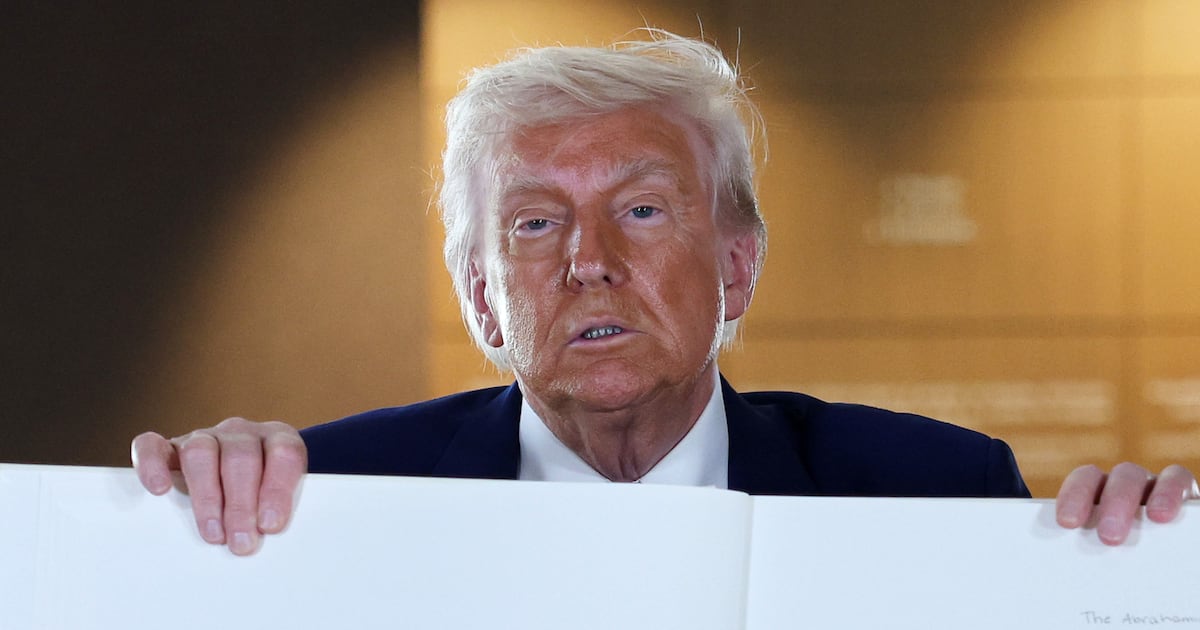
As we head into Tuesday’s debate, Barack Obama supporters buoyed by their candidate’s steady lead in the national polls should be wary. There’s a big elephant in the room, and it’s race. An AP/Yahoo poll released in September showed that Obama could lose as much as 6 percent of the vote on November 4 due to racial prejudices. The most recent polling from 18 swing states shows Obama has unambiguous problems with working-class voters, particularly in the crucial battlegrounds of Minnesota, Ohio, and Pennsylvania. Obama fares poorly with voters over the age of 40, working-class voters, and former Hilary Clinton supporters.
This has the potential for what political scientists call a Bradley effect, in which an African-American candidate like Obama fares better in the final, pre-election polls than he does in the final results. The Bradley effect was so named because of the 1982 California gubernatorial election, when Tom Bradley, the mayor of Los Angeles, had about an eight percent lead in the Field poll before being narrowly defeated by George Deukmejian. It was later seen with African-American candidates David Dinkins in New York City; Douglas Wilder in Virginia; Harvey Gantt in North Carolina; and, more recently, Harold Ford Jr., whose 2006 Senate campaign was undone by a commercial featuring a white Playboy bunny beseeching Ford to “ give her a call.” There has been a lot of debate about the nature and extent of the Bradley effect, but I have concluded from an examination of these prior elections and the results of the primaries that Obama could lose as much as three to four percent from his final poll tally due to its impact—particularly in swing states such as Ohio and Pennsylvania.
Obama also needs to identify himself clearly and unabashedly with fiscal conservatism, as well as traditional lifestyle issues and a commitment to faith and cultural conservatism.
Race, of course, is not Obama’s only problem with the white working class. For a lot of working-class voters who have never had a passport, never traveled, and rarely leave their communities, Obama’s journey from Hawaii to Chicago by way of Indonesia and Harvard Law is one they have trouble identifying with.
So what can Obama do to win over the white working class?
First, the financial crisis affecting Wall Street gives Obama a clear chance to articulate his message in terms these voters understand. Obama needs to show how financial failures on Wall Street lead inexorably to working-class Americans being at greater risk to their overall well-being. Obama needs to argue that the choice is clear between the failed policies of the Bush administration that have increased joblessness, increased the deficit, increased gas prices, and made homeownership more problematic because of foreclosures, and the records of Democratic presidents like Bill Clinton, where there was record growth on Wall Street, low unemployment, low inflation, and job development.
Obama needs to emphasize the economic results that flow from his fiscal plans: more jobs at home, affordable health care, and mortgage relief. These are benefits that working-class voters can identify with. Obama needs to stick with this message and drive it home on a day-to-day basis, certainly more than he did during the first debate.
This is merely the beginning. Obama also needs to identify himself clearly and unabashedly with fiscal conservatism, as well as traditional lifestyle issues and a commitment to faith and cultural conservatism.
Fiscal conservatism is very important to repositioning Obama’s candidacy. Obama needs to make clear that unlike George W. Bush and John McCain, who have turned a record surplus into a trillion-dollar deficit, he will commit to balancing the budget in his first term. He should commit to holding down spending and taxes and eliminating programs that don’t work. (Asked in the first debate to name a program that would be sidelined by the proposed $700 billion bailout, neither Obama nor McCain could come up with one.) Obama must say this in straightforward, easy-to-understand language: “No sacred cows in my budget. Not now, not ever.”
We found in the Clinton campaign in 1995 and 1996 that when we made the case that Clinton was a fiscal conservative, voters were willing to listen to the rest of our messages on the economy and environment and health care. The same is the case here based on the polling that I have seen.
Moreover, Obama needs to go a step further to reassure the white working class that he stands with them on social issues: that he doesn’t support gay marriage and the extremism of the right and left, and that he will stand with ordinary people.
How can he do this? He needs to emphasize his commitment to fighting crime, particularly black-on-black crime. He needs to recognize that there is a great deal of social and economic unrest in African-American communities, and that he himself is not going to ignore the nature and extent of the problem.
But beyond that, he needs to reassure voters that he supports parental responsibility and that he sees the problem in the way that the late Daniel Patrick Moynihan saw it in 1965—that there still is a crisis of the black family, one that has surely gotten better but one that is still unacceptable. (In June, Obama told a Chicago congregation, “We need fathers to realize that responsibility does not end at conception,” but lately that kind of rhetoric has not been part of his stump speech.) Obama needs to say he supports traditional values like patriotism and support for law and order. That he supports faith-based initiatives, and he believes we need to work on our existing religious institutions to strengthen traditional cultural values and institutions.
Moreover, Obama must show that he understands that the United States has a unique role to play in the world and that we stand for key core values that are eternal and indivisible. He needs to underscore that he shares and celebrates in the bipartisan tradition of American domestic and foreign policy that will protect our economic interests at home and around the world. This initiative has at its core emphasizing unabashedly our fight in the struggle against global terrorism, ultimately reinforcing the values that ordinary Americans live by every day through clear assertion of American values and interests.
It’s doubly difficult for Barack Obama to do all of this because he is African-American and of mixed racial heritage, with very different roots than successful African-Americans like Colin Powell or Condoleezza Rice. But it is not impossible. And if Obama commits himself to a focused, targeted campaign to reach working-class voters in the key swing states, he can minimize the impact of the Bradley effect and win what almost certainly will be a very close election.





